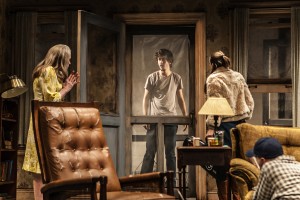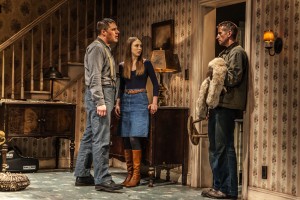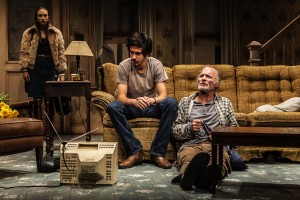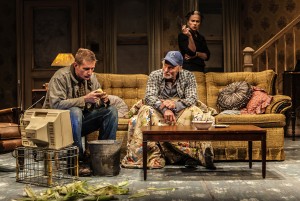BURIED BETWEEN THE LINES
In Scott Elliott’s surefooted staging of Sam Shepard’s imperfect Buried Child, watching Ed Harris sitting on a raggedy couch under an old blanket in front of a little TV while audience members shuffle into the house and settle in their seats is worth the price of admission. Mr. Harris melts into the role of Dodge, the decrepit head of a decrepit Illinois family living on a once prosperous but now defunct farm; we can almost smell the cheap whisky and old-man B.O. oozing from his pores as he waits for death to put him out of his misery. And we sympathize. His wife Halie (the excellent Amy Madigan, Harris’s real-life spouse), who lives in denial of the wretched reality around her, is stepping out on him with Father Dewis (an appropriately weaselly Larry Pine). His 40-something son Tilden (a wonderfully disquieting Paul Sparks) brings vegetables into the house, claiming to have picked them from their field, even though nothing has grown there in years. Not only does the slow-witted Tilden, who returned to Illinois after he got into some “trouble” in New Mexico, lack the sense to survive in society, but we get the feeling that left to his own devices he might well be capable of doing a lot worse than stealing corn from a neighbor’s farm.
Then there’s Dodge’s younger son Bradley (played with the menace of a big wounded child by Rich Sommer), who lost his leg in a chainsaw accident, and who now has a penchant for shaving his father’s head whenever dad is asleep. Long the object of his family’s ridicule, now that he has grown into a giant, even with his prosthetic leg, he has become the house bully. The one “good” son Dodge and Halie had, upon whom the parents had piled all their hopes, died years ago, and it’s not unreasonable to suspect that it was his death that elevated him to the pedestal on which he now sits in the minds of his mother and family.
It’s surprising, keeping in mind the play’s title and subject matter, just how funny Mr. Shepard’s work is, especially in Mr. Elliot’s hands. This abundance of humor, rich characters, dynamic dialogue and terrific performances, make watching The New Group’s production a worthwhile experience. Yet the play itself, for all its virtues, doesn’t quite deliver.
What strikes one immediately is that time frames of backstories don’t fit together. When Vince (Nat Wolff), Tilden’s hip and handsome college-student son, who hasn’t seen his father in 6 or 10 years (the ambiguity is intentional) shows up out of the blue with his girlfriend Shelly (Taissa Farmiga) for a surprise visit, neither Dodge nor Tilden admit to recognizing him. This is plausible. Their minds are foggy, so perhaps they really don’t remember him. Or, more likely, he is part of a reality they are incapable of dealing with. Less plausible however is when Vince, in trying to jog their recollections, shares his warm memories of seeing them all at a family gathering 6 (or possibly 10) years earlier. The idea that this family could have seemed happy, even to an adolescent, 10 years ago, is unconvincing. More unconvincing is that Tilden could have fathered a son in the condition he’s in, or that that son could have had warm memories of him. Was Tilden different back then? Was he “normal?” Based on the information we have it doesn’t seem likely. But if he was, what happened to him? We never learn.
Shelly, the play’s most puzzling character, is initially uncomfortable with Vince’s family; he leaves her alone with them overnight and they are hostile to her. But in the morning she suddenly seems happy, and declares that she feels at home in their house, more at home even than they do themselves. It’s an interesting turn of events. Yet we never get any insight regarding her change of heart. Nor do we understand the purpose for this transformation, as Shelly’s newfound connection to the house has no consequences and evaporates fairly quickly.
There are enough similar incongruities in Buried Child for one to get the sense that perhaps they are meant to be ignored. That despite its realistic feel the world constructed is supposed to be in fact surreal. That Mr. Shepard isn’t concerned with the logic of how characters and events came to be the way they are, they just are, and that’s it. This high-chinned attitude extends to the drama as well. The family is hiding a terrible secret, and we learn what it is towards the end. But how concerned, really, is Mr. Shepard with the dramatic effect of this discovery? Besides being hinted at several times throughout, the secret is in the play’s title. In fact Dodge’s monologue, in which he finally tells the whole story, is so obvious it feels almost like parody. As does Vince’s final speech, which is so banal I really don’t know what to make of it.
And this is finally Buried Child’s problem: It feels banal. One can argue about the play’s details’”who is really the buried child referred to in the title? what really happens between Bradley and Shelly? are these characters who they say they are?’”which are open to interpretation. But in the end, while the play supplies tension throughout, it offers no revelations, only statements: Midwestern families would rather commit the worst crime in private than suffer public ridicule. No matter how hard the son tries to leave he can never escape the whirlpool of his family, and is doomed to repeat the sins of his father, who was doomed to repeat the sins of his father, and so on. This is all good stuff, and it may or may not be true. The issue is that Mr. Shepard tells us these things as opposed to letting us discover them on our own, thereby denying us our epiphany, our moment of ecstasy, and leaving us thoughtful but unsatisfied.
photos by Monique Carboni
Buried Child
The New Group
The Pershing Square Signature Center
Alice Griffin Jewel Box Theatre, 480 West 42nd St
ends on April 3, 2016
for tickets, call 212.279.4200 or visit The New Group








